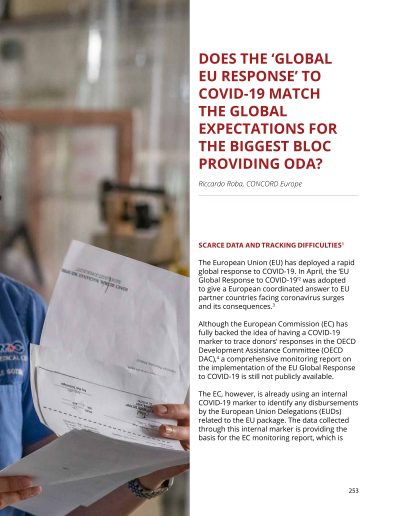
DOES the ‘Global EU Response’ to COVID-19 match
the global expectations for the biggest bloc providing ODA?
Riccardo Roba, CONCORD Europe
Resources to support the EU Global Response have usually been
redirected from already budgeted items. A different approach is needed, one that recognizes COVID-19 as a new shock requiring additional funds.
In this chapter, CONCORD Europe‘s Riccardo Roba evaluates the ‘EU Global Response to COVID-19 launched in April 2020, calling for the recognition of the pandemic as a new concern requiring additional funds rather than redirection of prior ODA, and examines the Team Europe package as a potential example of multilateralism effectively meeting the needs of the most vulnerable partner countries.
TABLE OF CONTENTS
POLITICAL CHAPTER: Aid in the Time of a Global Pandemic: Confronting the challenges of fragility, poverty and climate change
I. REFLECTIONS ON FRAGILITY, CONFLICT AND THE TRIPLE NEXUS
1. Donor interests over effective development cooperation? USAID and the “triple nexus” approach in the Philippines
2. A region embattled: Situating the Triple Nexus in the Asia-Pacific context
3. Examining the effectiveness of the Humanitarian, Development and Peace Nexus in the Lake Chad region
4. Engendering the Nexus: Mainstreaming gender in the Triple Nexus, a case study from Mali
5. Vision on social protection systems and social security in Palestine
6. Fragility, the challenge of our century
II. RESPONDING TO A CLIMATE EMERGENCY
1. Climate change and development cooperation in South Asia
2. The World Bank’s climate finance: Transformative change, or doubling down on neoliberal globalisation?
3. Escazu Agreement: An opportunity for the peoples of Latin America and the Caribbean in the face of environmental crises
III. GLOBAL AID TRENDS
1. GLOBAL AID TRENDS CHAPTER: The future of aid in the time of the pandemic: What do global aid trends reveal?
2. Challenges for the construction of South-South Cooperation by and for the people
3. International cooperation for educational justice
4. A worsening poverty landscape with COVID-19
5. Debt relief and ODA
6. A Pacific compact
7. Aid performance: Belgium called to do better
8. Canada’s international assistance: underfunded feminist ambitions
9. Does the ‘Global EU Response’ to COVID-19 match the global expectations for the biggest bloc providing ODA?
10. France: A key layer in the future of aid, despite an inadequate response to the crisis?
11. Increases in Japan’s ODA/GNI Ratio: Should we celebrate it?
12. Sweden: Drive for democracy, feminist foreign policy, climate and biodiversity remain key priorities in the context of the COVID-19 pandemic
13. United Kingdom: COVID as catalyst: seismic shifts in UK aid
